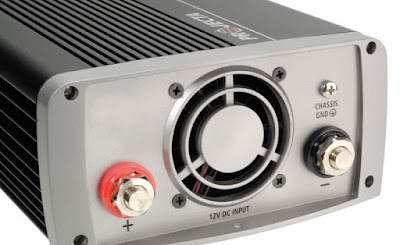When Should You Use a Pure and When a Modified Sine Wave Converter
An inverter is a device whose primary
job is to convert the DC (direct current) power from a battery bank
or from the solar panels into AC (alternating current). The reason
this is done is because most appliances run on AC and as such if
there is ever a need to power them through a car battery if you are
on a RV holiday or if you meant to convert the solar panels energy in
an attempt to save a bit on the electrical bills, then you will
definitely need an inverter.
In order to change the current the
inverter must take the constant voltage and change it to a sine wave
curve that goes above and below 0 volts. Initially this was done by
making the voltage go straight up and straight down and in the
process creating a blocky signal, which is called a modified sine
wave. More advanced modified sine waves make multiple steps and do
better to come closer to what is called a pure sine wave, which more
closely matches the wavelength of the actual AC.
The greatest difference between the two
types of inverters is their price range as predictably the modified
sine wave converter is much cheaper than the pure. However even if
you do save some money on the purchase, it isn't certain that it will
pay off as the modified inverter is compatible with a smaller number
of items and is not as efficient even when it is. Additionally, with
the advancement of technology the price of the pure sine wave inverter is also steadily but surely coming down, making it the
more viable option.
While a modified sine wave inverter
will get the job done most of the time, there are some cases where it
may cause damage or just not be very efficient. The primary category
of devices that run more efficiently with a pure sine wave inverter
is electronics that use AC motors, like refrigerators, compressors,
and microwave ovens. They’ll still work in most cases with a
modified inverter as well, but they may not work as efficiently,
which may lead to excess heat build-up and the potential for
associated damages.
Just to be clear, if it doesn’t use
an AC motor, isn’t a delicate piece of medical equipment, doesn't
use silicon-controlled rectifiers or thyristors , then you’re
probably going to be in the clear if you use a modified sine wave
inverter. The choice in the end will depend on whether you want
economy or comparability, but generally the pure sine wave inverter
is usually the better option simply because you don't have to worry
about any bad effects that it might have on the devices that are
hooked up to it.



Comments
Post a Comment